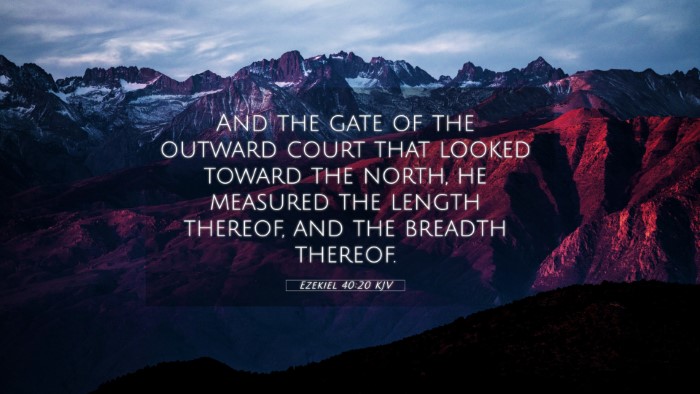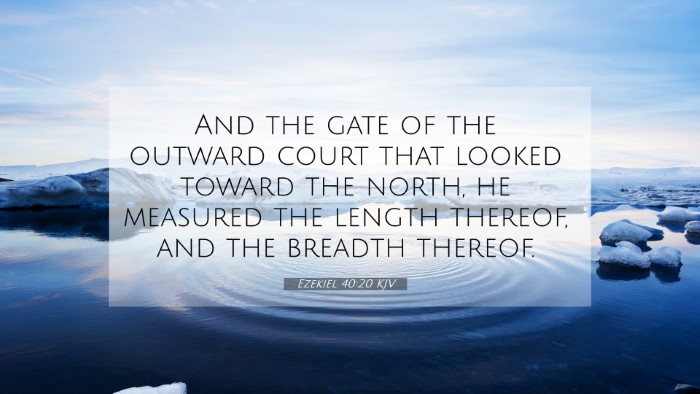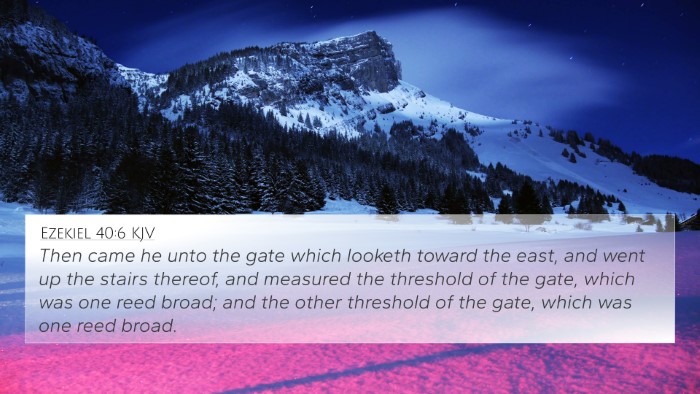Understanding Ezekiel 40:20
The verse emphasizes the detailed instructions regarding the temple's design. It highlights the importance of order and functionality in worship, reflecting God's intention for His dwelling among His people.
Key Themes
- Divine Architecture: God's precise specifications for the temple show His desire for holiness and order.
- Worship and Access: The gates signify accessibility to God, an essential aspect of worship in the Israelite faith.
- Northward Orientation: Symbolically, the northern direction can represent various scriptural meanings, including judgment and warning.
Commentary Insights
Matthew Henry: He notes that the measurements recorded are essential for understanding the sanctity of the space. The repeated focus on dimensions signifies the importance of adhering to God’s specifications in worship.
Albert Barnes: Barnes emphasizes the significance of the north gate, suggesting that it could represent an area of prophetic significance and the focus of judgment in many instances throughout Scripture.
Adam Clarke: Clarke discusses the architectural symbolism, arguing that the description serves to establish a physical marker of God's presence and the nations' access to Him, emphasizing the inclusivity in God's plan for salvation.
Bible Cross-References
Here are several verses that interconnect with Ezekiel 40:20:
- Isaiah 60:11: Discusses the gates being open for the nations, paralleling the themes of God's invitation.
- Revelation 21:12-13: Mentions the gates of the New Jerusalem, reaffirming the significance of access to God.
- Matthew 5:14: "You are the light of the world..." connects to the sacredness of the temple and the believer's role in reflecting God's glory.
- Psalms 118:19: "Open to me the gates of righteousness," showing the believers’ desire for access to God’s presence.
- Exodus 25:8: "Let them make me a sanctuary; that I may dwell among them," linking the temple as a dwelling place for God.
- 1 Corinthians 3:16: "Know ye not that ye are the temple of God," drawing comparisons between the physical and spiritual temple.
- Ezekiel 43:1-4: Discusses the glory of the Lord entering the temple, showcasing the culmination of God's presence.
- John 10:9: "I am the door; if anyone enters by me, he will be saved," reflecting the themes of access and salvation.
- Hebrews 9:2: Mentions the first tabernacle, connecting the Old Testament practice with New Testament revelations.
- Zechariah 8:20-23: Points toward the gathering of nations and the need for access to worship, linking back to temple imagery.
Thematic Connections
This verse serves as a crucial link in understanding the Old Testament's temple theology and its significance in the New Testament. The physical temple foreshadows the spiritual temple in Christ and the church as the body of believers.
Tools for Bible Cross-Referencing
Utilizing tools for cross-referencing can significantly enhance one’s Bible study experience:
- Bible Concordance: Helps locate themes and specific words across various scriptures.
- Bible Cross-Reference Guide: Offers insights on how specific verses correlate with broader themes.
- Cross-Reference Bible Study: Systematic approach to connecting verses for deeper understanding.
- Bible Reference Resources: Provides a framework for thematic exploration through scriptural connections.
Conclusion
Ezekiel 40:20 serves as a reminder of the importance of God’s presence and the detailed plan He has for the interactions between Himself and humanity. The connections established through cross-referencing various biblical texts deepens our understanding and appreciation for God’s ongoing narrative from the Old Testament to the New Testament.



